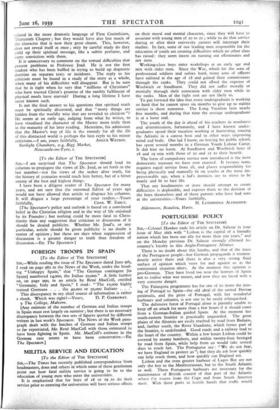MILITIA SERVICE AND EDUCATION
[To the Editor of THE SPECTATOR] Sta,—The Times has recently published correspondence from headmasters, dons and others in which some of these gentlemen point out how fatal militia service is going to be to the education of young men who enter the universities..
It is emphasised that for boys of a or 19 to do their service prior to entering the universities will have serious effects
on their moral and mental character, since they will have to associate with young men of 20 to 21 ; while to do that service during or after their university careers will interrupt their studies. In fact, some of our leading men responsible for the education of youth are creating difficulties which no other class has raised : they seem intent on turning out effeminates and not men.
Working-class boys enter workshops at an early age and mix with older men. Since the War, which hit the sons of professional soldiers and sailors hard, many sons of officers have enlisted at the age of 18 and gained their commissions through the ranks. They could not afford the expense of Woolwich or Sandhurst. They did not suffer morally or mentally through their connexion with older men while in the ranks. Men of the light sort are not likely to.
To put forward the idea that every undergraduate is working so hard that he cannot spare six months to give up to militia service is sheer nonsense. The Long Vacation lasts nearly five months, and during that time the average undergraduate is at a loose end.
The youth of the day is ahead of his teachers in manliness and determination, fortunately, and I have known under- graduates spend their vacation working at harvesting, touring the Adriatic in a canvas boat and in other ways improving mind and body. One lad I know, on leaving his public school, has spent several months in a German Youth Labour Camp. It did him no harm. At Sandhurst and Woolwich boys of
18 and 19 mix with those of 2o and 21 to their benefit. The form of compulsory service now introduced is the most
democratic measure we have ever enacted. It favours none, requires equal service from all, and places responsibility for being physically and manually fit on youths at the most im- pressionable age, when a lad's instincts are to strive to be manly and fit to face life.
That any headmasters or dons should attempt to create difficulties is deplorable, and exposes them to the derision of the boys themselves and of those parents who have had sons at the universities.—Yours faithfully, Aldermoor, Beaulieu, Hants. H. LETHBRIDGE ALEXANDER.






















































 Previous page
Previous page